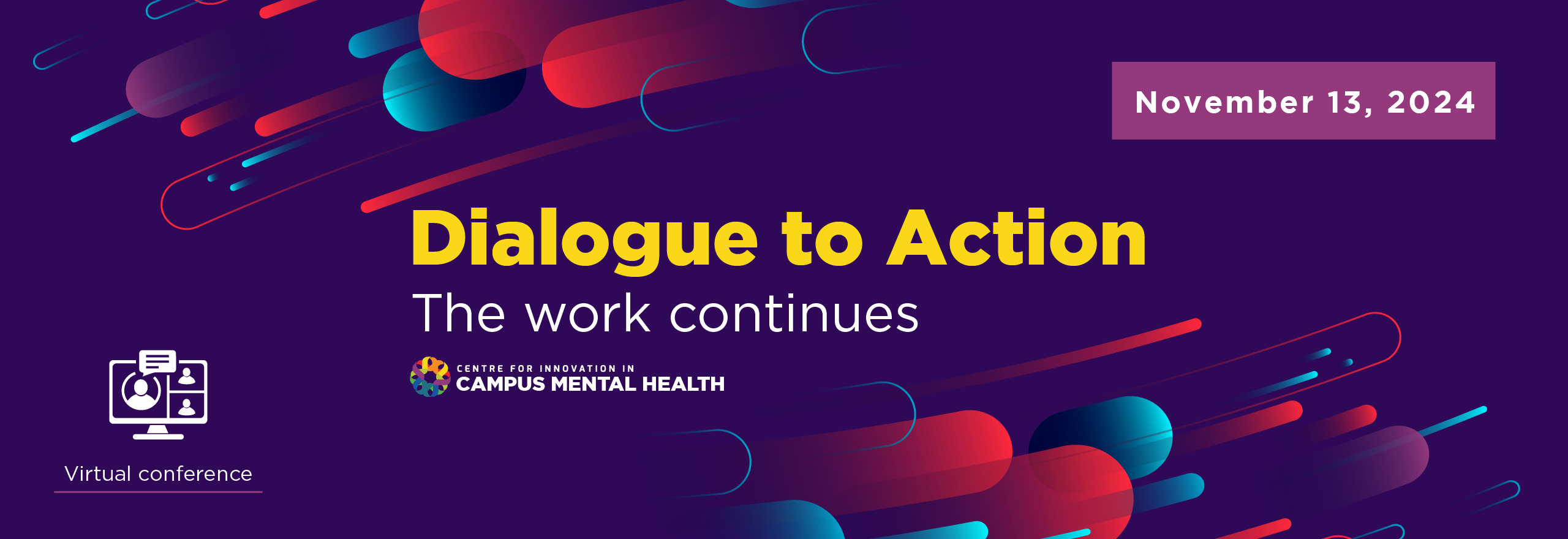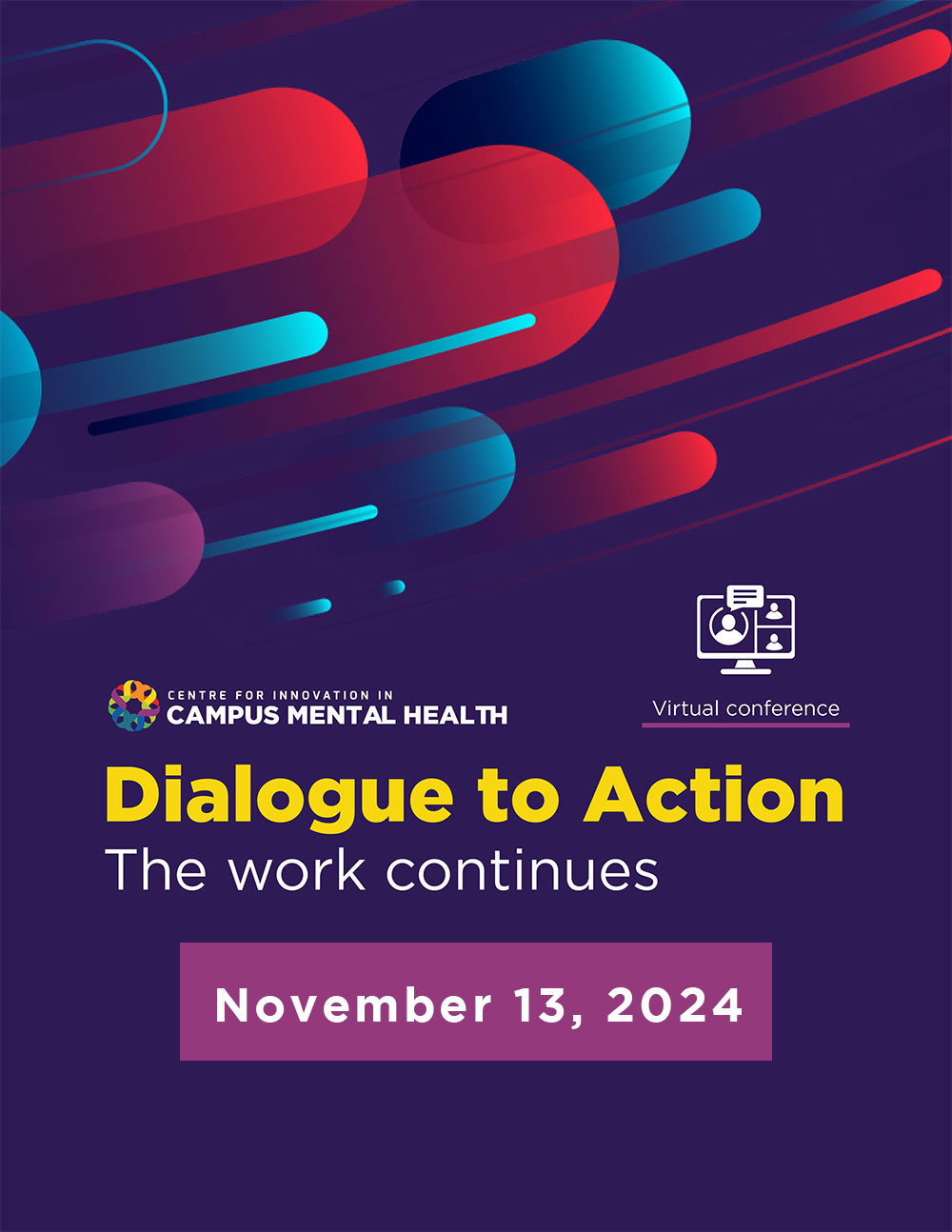Call for Abstracts
Conference Theme: Dialogue to Action: The work continues
We are continuing with our theme from last year, “Dialogue to Action” with the addition of “The work continues” since we continue to work towards improving capacities on Ontario campuses in supporting student mental health. We acknowledge that dialogue is a critical step in the process of shaping change; it allows us to share ideas, work through logic, and problem-solve together. However, this process gets us nowhere without being combined with continuous action. Throughout the conference, attendees will be encouraged to take initiative, put in the effort, and make moves to bring our collective vision of a healthy campus to reality. In working with this theme, each conference session will feature a call-to-action for participants to consider and join. Through this lens, we will also be exploring topics that embed and examine the social determinants of health.
To facilitate this discussion, we will delve into the five following streams:
 Equity, Diversity, Inclusion, Accessibility, and Anti-Racism (EDIAA)
Equity, Diversity, Inclusion, Accessibility, and Anti-Racism (EDIAA)
There is a growing movement for institutional leadership and campus frameworks to implement equity, diversity, inclusivity, accessibility, and anti-racism-related policies to ensure equitable access to services and programming on campus. Province-wide, there has been a focus on understanding the unique needs of students based on the various intersections of their identity, such as culture, race, religion, sexual orientation, and physical or mental health disability. Presentations in this stream will address equity-driven and student-driven programming.
 Changing Systems
Changing Systems
Presentations in this stream will focus on the overarching systems of mental health provision on campus and how students and staff are challenging and changing those systems through anti-oppressive practices. Presentations in this stream will speak to systemic barriers within this work and strategies for shifting the structure and organization of mental health services on campus through the implementation of EDIAA (Equity, Diversity, Inclusion, Accessibility, and Anti-Racism) principles, including work around the National Standard for Mental Health and Well-Being for Post-Secondary Students.
 Indigenous Student Wellness and Engagement
Indigenous Student Wellness and Engagement
Presentations in this stream will center around Indigenous world views grounded in holistic understandings and the value of interrelatedness as a model for wellness and engagement of Indigenous student populations. Areas of focus may include embracing Indigenous worldviews in campus and learning environments, Indigenous pedagogy, and educational interconnections.
 Student Engagement
Student Engagement
Facilitating connection and belonging among students is vital to counter the increasing experiences of isolation and loneliness in the virtual world. The recent shift away from being physically on campus has highlighted a need to devise innovative strategies that allow students to meaningfully engage with their institution and peers. Presentations in this stream will center around innovative initiatives that create meaningful programming for students outside the classroom environment, utilize peer-to-peer models to develop meaningful relationships among students, emphasize communal spaces for students to address mental health and wellness topics, and feature co-design with students.
 Substance Use & Harm Reduction
Substance Use & Harm Reduction
There has been an increase in substance-related harms and problematic gambling behaviours on campuses. Presentations in this stream will focus on the use and misuse of drugs, alcohol, and other substances by student populations, as well as gambling-related harms. Example topics might include trends and patterns in student substance use, harm reduction programming on campus, strategies for reducing substance-related harms, and responsible gambling strategies.
Conference sessions will be offered in two formats:
- Concurrent Sessions
A concurrent session provides a platform for presenters to share expertise and for participants
to gain new knowledge and/or a new skill. - Virtual Poster Presentations
Display space for Virtual Poster Presentations will also be offered. Please prepare your poster
as a PDF document.
All submissions will be evaluated using the following criteria:
- Relevance to the conference theme.
- Clarity and coherence of submission.
- Relevance and utility to participants.
- Evidence that the submission will encourage interaction with conference participants.
- It is encouraged that presenters include a lived experience component or perspective where relevant.
Acceptance as a presenter:
- Presenters must register for the conference. Honoraria and travel reimbursement are not available.
- Presenters will be asked to submit an electronic version of their presentation two weeks prior to the conference.
- Recordings of the presentations will be made available to conference delegates following the conference.
- Presenters are encouraged to provide written material to conference participants in both French and English (if available).
- Presenters will be provided with a designated time to present by the conference committee.
- Accepted presenters will be provided with essential training on the use of the conference platform. This will involve a live training session prior to the conference, that will take approximately 1-hour.
For further information please contact Sherry Sim, Event Manager at sherry@innovative4you.com or by phone at 1-866-655-8548.

